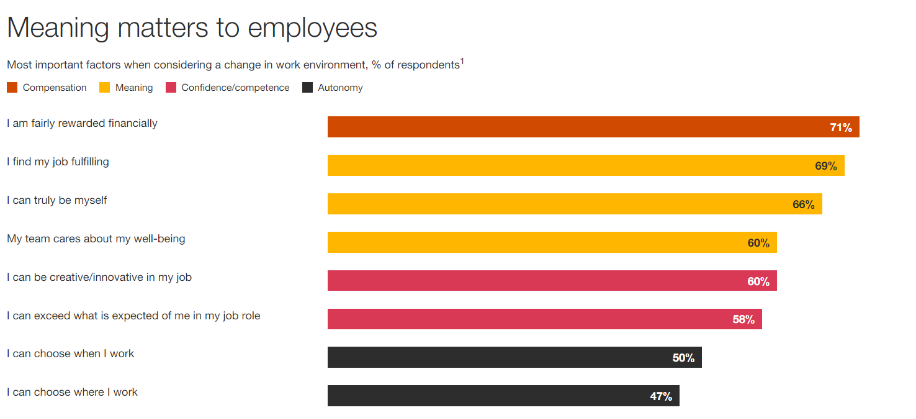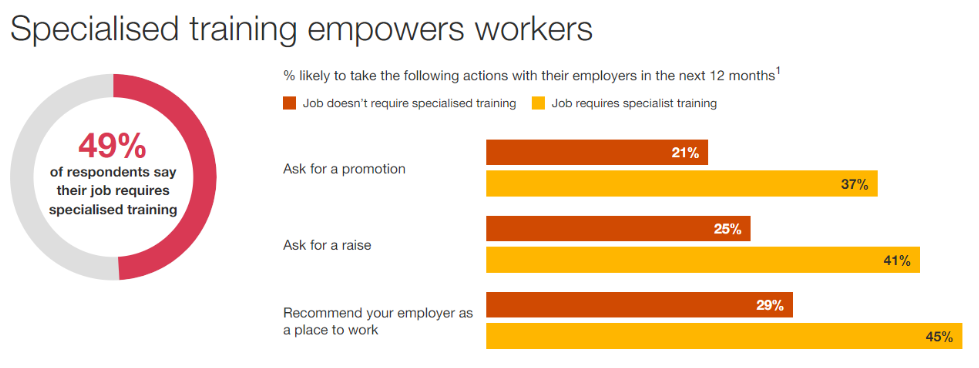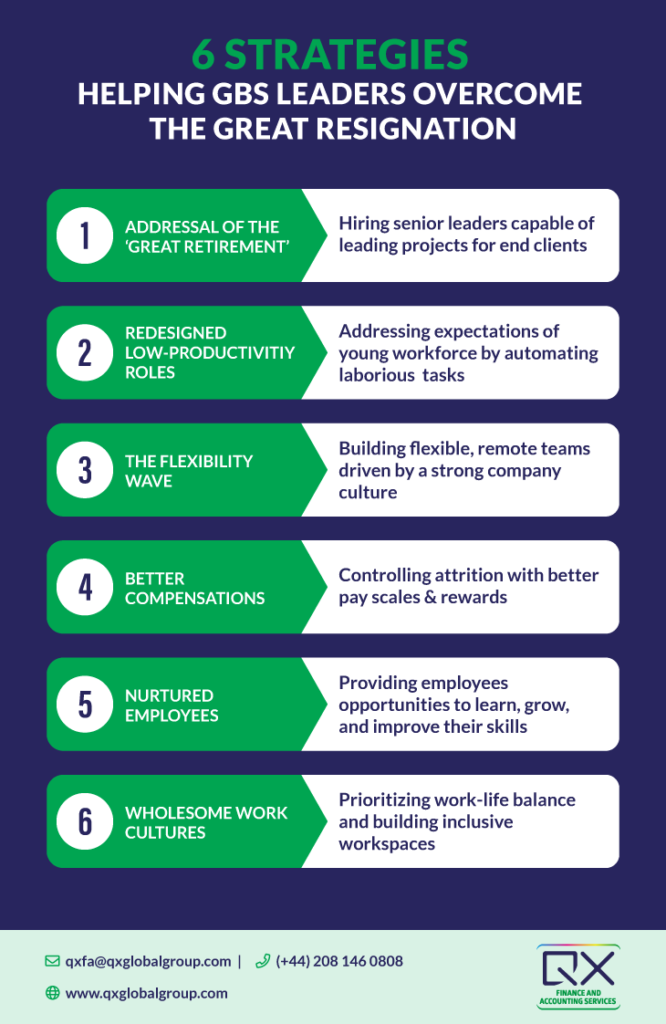Topics: GBS, global talent shortage, Outsourcing
The Great Resignation is Far from Over & Here’s How GBS Leaders are Addressing the Acute Talent Shortage
Posted on August 16, 2023
Written By Siddharth Sujan

Of the many business landscape changes to have occurred in the past few years, talent shortage has undeniably had the most severe impact. Finding and retaining skilled individuals at scale has always been a challenge, but the ‘Great Resignation’ exacerbated the problem significantly. In such tumultuous times, GBS (Global Business Services) organizations have particularly had a tough time managing & overcoming what has been rightly called the ‘talent war’.
While Covid-19 might have acted as a catalyst, the bitter reality is that the Great Resignation was long coming.
But what exactly caused professionals to leave their jobs? How real is the threat? How are GBS leaders reacting to ensure the success of their GBS projects? Let us take a deep dive by breaking down each of these aspects.
According to ManpowerGroup’s Talent Shortage Survey, 77% of employers reported difficultly in filling roles in 2023 – a 17-year high!
Why are working professionals leaving their current positions?
To understand the reasons behind the talent shortage, it is first important to address the fact that the general business landscape that had been prevalent for decades had a lot of existing problems. When the pandemic hit, work as we knew it, changed forever.
Millions around the world had to suddenly shift from in-person to remote setups while countless others lost their jobs altogether. This sudden shakeup brought about a major attitudinal shift where individuals began evaluating both, their career and life choices.

Some of the key reasons which attributed to high attrition rates during the Great Resignation are:
1. Inadequate Pay & Lack of Benefits: Even though there are several industries where the workforce has been traditionally paid well, the shift to remote work opened up many opportunities for professionals.
Skilled accountants, for instance, with specialization in key functions like accounts payable & accounts receivables were no longer restricted by location and hence, would not have to wait endlessly for their benefits checks. This globalization of work in its truest senses enabled professionals to easily find & take up jobs that offered higher pay and better growth opportunities.
2. Work-life Balance: One of the biggest factors that has contributed to the shift from a buyer’s to a seller’s market is the dialogue around productivity & work-life balance. Overwork, always-on communication, long hours and burnouts had almost become synonymous with the corporate culture. With the Covid-19 outbreak, working professionals were left with no choice but to make a sudden transition from in-person to remote.
This shift was considered a big challenge at first. However, as the workforce started spending more time outside of the office space, priorities changed and, in most cases, productivity only improved. As a result, individuals came to be driven by not only higher pays but also by the quality of life they would lead eventually.
3. Underinvestment in Training: For years, businesses across the world had continued to follow a burn & churn model with little to no investment in training its employees. The uncertainty of the business environment during the Covid-19 outbreak led to some harsh realizations for a major chunk of the workforce. Upskilling soon became the need of the hour and companies who failed to aid to the needs of their workforce ended up experiencing higher attrition rates.
4. Flexibility Within Organizations: As a by-product of training & upskilling and the general market volatility, a big section of the working population desired to remold their career growth by moving to a different function within the same organization. Working professionals, therefore, inclined towards companies that believed in nurturing its employees, rather than those with a traditional, rigid & hierarchical approach.
How real is the talent shortage threat?
Many believe that as the world strides towards a state of normalcy, the talent shortage is going to be a thing of the past. However, numbers suggest otherwise. According to a new report by LinkedIn, more than half of U.S. workers — 61% — are considering leaving their jobs in 2023.
The bottom line remains that the very reason behind the Great Resignation, and is what now being referred to as the ‘big quit’ was a cultural change in the work environment and unless companies adapt to the new realities, they will struggle with hiring & retaining talent. And needless to say, a talent shortage, especially in critical functions like finance & accounting can prove to be catastrophic.
How are GBS Organizations Addressing the Talent Shortage
Much like every other industry, the idea of work in GBS organizations has also changed drastically. Considering the fact that talent still makes for the backbone of this industry, it has become critical for GBS leaders to think outside the box, adapt a flexible approach, embrace the use of technology and build motivated teams of young, trained professionals.
RELATED BLOG: Want to know how centralized models helped rapidly expanding recruitment agencies face COVID-induced challenges? Read our blog now!
Let us touch upon a few key strategies that are helping forward-thinking GBS leaders weather the storm:
1. Addressing the ‘Great Retirement’: A problem quite unique to GBS and Shared Service organizations, the ‘Great Retirement’ has coincided with the Great Resignation to further hamper the access to talent.
As GBS is 25-30 years old as a concept, the initial crop of senior leaders is nearing retirement, leaving a vacuum to be filled. In such an environment, it has become essential for GBS organizations to address this challenge and hire senior leaders capable of leading projects for end clients.
2. Redesigning Low-productivity Roles: Skilled professionals, for a long time, have shied away for working in GBS organizations due to the mechanical nature of work in back-offices with limited growth opportunities.
Let’s face it – no young, motivated individual would be keen to work in a monotonous back-office with the sole purpose of being a cheaper resource that helps reduce operational costs for a big corporation.
Modern GBS leaders will therefore, have to understand the needs of the young workforce and take active calls for their positions by making these roles more fulfilling and sustainable while automating any repetitive and laborious tasks.
3. Riding in on the Flexibility Wave: If there’s one universal learning from the Great Resignation, it is the fact that flexible, remote work is here to stay. The demand for flexibility is at an all-time high – so much so, that it has emerged as one of the biggest factors for individuals to take up roles.
As a result, future-ready GBS organizations will have to become a more flexible in their approach and ensure that they provide all required tools to their employees, enabling them to work from anywhere, anytime. In fact, companies will also be expected to make extra efforts in building & maintaining the company culture in a WFH setup.
Adapting such an approach is bound to not only improve employee experience, but also help organizations broaden their horizons with a global talent pool.
4. Better Compensation: Better financial opportunities was one of the biggest drivers of the Great Resignation with individual leaving their existing roles for 10, 20, 50 or even higher percentage of salary hikes for same or similar roles.
In a bid to keep attrition rates under check, successful GBS companies will now also look at reevaluating pay scales, working on additional benefits and offering bonuses to keep their workforce satisfied.
5. Training & Nurturing Employees: Successful GBS leaders are now making a shift from the traditional ‘talent hunting’ mindset to a ‘talent farming’ mindset. Contrary to the old norms, providing employees to learn, grow, and improve their skills is now commonly being accepted as an organization’s responsibility.
In addition, many GBS leaders are also providing financial aid for college tuition, certificate courses and more to help extract full potential of their workforce whilst bringing down retention rates.

6. Creating Wholesome Work Cultures: In contrast to the traditional methods of overworking and creating high-pressure scenarios that result in burnout, modern GBS leaders are realizing the link between productivity and employee well-being.
Adapting flexible work cultures where work-life balance is prioritized and building inclusive workspaces is one big step that is helping these companies find & retain top notch finance &accounting professionals.
RELATED CASE STUDY: Do you know that QX worked with a recruitment giant to set up a GBS center, delivering annual savings of over £5 million? Read the case study now!

QX Global Group: Your Reliable GBS Partner
QX Global Group is a global Business Process Management (BPM), Technology and Consulting company with expertise in setting up future-ready Shared Services and GBS centers for businesses across industries. QX is a Great Place to Work® certified company with a global talent pool of 3,000+ professionals that allows our clients spread across 15+ leading industries to overcome talent shortage and challenges associated with rising operational costs.
Since our inception in 2003, we have leveraged our unique People-Process-Platform approach to enable digital transformation for our clients by optimizing key finance functions like accounts payable, accounts receivables and management reporting amongst others.
Our teams work to deliver end-to-end solutions that cover transformative consulting, digital services, and business process outsourcing, customized to meet each client’s specific needs. Get in touch to accelerate your finance transformation journey today!
Originally published Aug 16, 2023 08:08:18, updated Apr 07 2025
Topics: GBS, global talent shortage, Outsourcing







